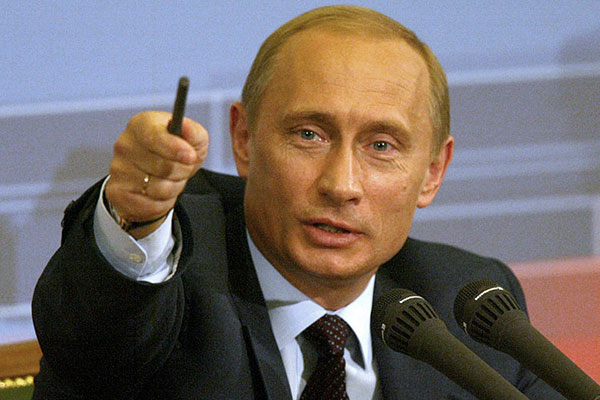America is Not Superman

As a stopped clock is right twice a day, the American pundits I criticized here in May and June — Leon Wieseltier, David Brooks, William Kristol - were right to warn that Vladimir Putin is a menace and that his Russia is evolving into a danger to liberal democracy. It doesn’t matter that Putin didn’t have his finger on the trigger of the anti-aircraft missile that brought this truth home to Europeans whose pusillanimity our pundits never tire of exposing.
The same pundits - and I would add Charles Krauthammer, Robert Kagan, Richard Cohen, Roger Cohen, and many more — were also right when they said such things and worse about Saddam Hussein, even if they were wrong then about who had what finger on what triggers. But where did their alarums take us and Iraqis?
The answers are horrifying enough to justify our asking what’s driving such people’s constant warnings and where their current drum-banging would take us, Europe, and Russia.
What, we’re entitled to ask, drove some of these same pundits to urge the United States to arm mujahedeen against the Soviets in Afghanistan, thereby empowering the Taliban and Osama Bin Laden? What drove some of them to agitate for war with Iran? What drove some of them even to justify the Vietnam War, even retroactively, against its obvious folly?
What has always driven them to expend so much energy disparaging and discrediting those who’ve doubted the wisdom of such ventures? Might there be a pattern of motivations - a syndrome - that only occasionally intersects with reality, as it seems to be doing now in Ukraine?
That it is a pattern, not just a disjointed series of bad judgments, is evident in the writings of the pundits themselves. “The world has become normal again,” wroteRobert Kagan in 2007, exulting that liberal democrats who’d imagined “the end of history” with the end of the Cold War were awakening to the eternal necessity of face-offs with thugs in places such as Iraq, in Iran, in Libya, in Syria, and so on.
What drives his and others’ exultation, not to say gloating, about liberals belated recognition of dangers such as the one that brought down the Malaysian Airlines flight is their understandable but misdirected obsession with dispelling the specter of Neville Chamberlain’s appeasement of Hitler in Munich, 1938.
Kagan and the others feel driven to dispel that specter — and to make the world safe for a liberal world order they’ve become incapable of questioning - by reviving neo-Wilsonian war fevers of 1917 and Wolfowitzian war fevers of 1997/2003.
They never reckon seriously with the truth that the first of these war fevers only seeded the rise of fascism and Communism from within the interstices of the liberal world order they supposedly championed, leaving us with World War II, the specter of nuclear Armageddon, the Cold War, the Vietnam War, and other disasters
The second, Wolfowitizian fevers delivered what we’ve torn open and left broken in Iraq, Afghanistan, and Pakistan. Similarly misdirected if understandable obsessions have driven Israel to seed something worse than what it might have enabled had its leaders not been just as obsessed as Kagan and his cohort.
Certainly these pundits’ warning that much of the world is cold, dark, and hard is a truism: It’s always true on one level, but not always therefore useful, and sometimes it’s actually destructive. Someone who’s demonstrably fixated on issuing such warnings, not just twice a day but every hour of the day, has probably internalized a bit too much of the world’s coldness, darkness and hardness to be very effective in countering it.
There are indeed times (as I put it here in March) when liberals must fight to defend liberalism and defeat enemies who’ve arisen, as did fascism and much of Communism, from within the interstices and contradictions of liberal capitalism itself. I endorsed the historian Timothy Snyder’s claim that “the real danger to a democratic Europe is Putin’s aggrieved, aggressive, and suppurating Russia.”
But some pundits and political leaders such as Rudy Giuliani, whose 2008 presidential bid was supported by some of the pundits I’ve mentioned, seem to livefor such times — and to forget or deny that the Western liberal order fosters some of these menaces and won’t truly overcome them by displacing all of the blame onto the obvious outliers and outlaws.
That so many American opinion makers and political leaders (and the Rupert Murdochs who encourage them) fail to understand and actively blur such distinctions is as great a danger as Saddam Hussein and Vladimir Putin are to our republic and its deepest sources of strength. That’s the tragedy of the bellicose pundits. It should be explored with greater depth (and even empathy) than I can offer in this post.
But if you have literally two minutes to watch a humorous instance of this tragic misunderstanding and miscarriage of American strength and promise, watch this exchange, which I witnessed in Amsterdam in 2009, between Robert Kagan and one of his favorite targets, France’s then-foreign minister Dominique DeVillepin, who had blocked Security Council approval of the Iraq War.
Watch Kagan exult that even though Americans have only “piggy-backed” on Western civilization and the Enlightenment instead of creating a civilization themselves, they’ve become —like Superman, on whose example Kagan says proudly that he was raised — the most trustworthy defenders of that civilization “from Europe” itself. Feel his truism’s allure, as the editors of The New Republicundoubtedly did when they published Kagan’s recent essay, “Superpowers Don’t Get to Retire.”
Then watch DeVillepin explain what Kagan missed: That Superman today not only rescues people from catastrophes; he generates them, financially, culturally, and militarily, and sometimes resembles a Frankenstein. And think about where Americans are now, thanks partly to the misapprehensions propagated by Kagan, Kristol, Wieseltier, and Brooks. Freedom and the American republic are in trouble, alright, but these writers’ bad judgment is no small part of the reason.